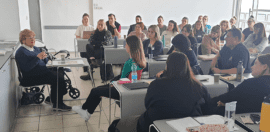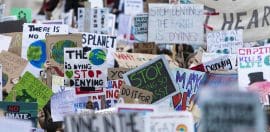Bittersweet Birthday Celebration for Asylum Seeker NFP
9 June 2016 at 10:13 am
Australia’s largest asylum seeker advocacy, aid and health organisation is calling for an end to the “toxic bipartisan leadership” which has made the average Australian “fear and resent” asylum seekers, as the Not for Profit celebrates it’s 15th birthday.

ASRC Volunteers celebrate the organisation’s 15th birthday
The Asylum Seeker Resource Centre (ASRC) started as a 20 square metre shop front as part of a TAFE project in 2001.
Since then the community-led Not for Profit organisation has helped over 13,000 refugees and people seeking asylum.
But CEO and founder Kon Karapanagiotidis OAM told Pro Bono Australia News the birthday milestone was “bittersweet” as the world today is faced with the worst humanitarian crisis in the last 40 years.
“It’s always a mixed bag in terms of the fact that we are still needed, but at the same time we are proud that we’re still here. So it’s a bit of both,” Karapanagiotidis said.
“I can’t believe we’ve reached 15 years, it’s incredible.
“It’s a bit surreal, we started it in eight weeks as a TAFE class project, with 40 students that I was teaching at the time and it went from that, in a little 20 square metre shop front, with furniture from my mum’s, a few hundred dollars and a rent free shop from my friend Pablo, to now the largest asylum seeker organisation in the country. So we’re now a $10 million organisation, 120 staff, 1,300 volunteers, 200 times the size, 13,000 refugees helped, so yeah it’s really grown a lot.”
Karapanagiotidis said the highlight over the course of the organisation’s 15 year history was the people that they have been able to help.
“Some 13,000 people have come through our doors seeking welcome and hope and sanctuary, and the fact that we’ve been able to be more than a charity, but rather a movement and a place of hope for people, and we have created a place that has helped save the lives of thousands of people, is something really beautiful,” he said.
“It’s been quite a dark time the last 20 years when it comes to how we treat refugees, so it’s also worked as a catalyst and a bit of a beacon of hope for a lot of people in the community who feel the same way as I do… It gave them a place where they could come and… they could take that anger about what was being done, and they could do something positive and constructive with it. And I think that has been huge.
“There are thousands and thousands of people that have volunteered their time here, and tens of thousands that have supported us.
“So what’s really beautiful is that it has also been a place where people come and volunteer the best of them, their passion, their energy and bring the best of them and there is an amazing sense of community.
“People feel connected and empowered to create real social change, that’s what our volunteers tell us as well, which is really beautiful that they feel like being here allows them to create that social and political change.”

Kon Karapanagiotidis, CEO and founder of the ASRC
Karapanagiotidis said there was still a lot than could and must be done.
“There is a lot of different things that we can do. From the macro to the micro,” he said.
“ At the micro level it’s the simple things we say to people, which is go and donate your time and energy to any refugee charity in this country, go and do something practical.
“Two, demand better from your political leadership, actually demand leadership that treats refugees humanely rather than punishes them and harms them.
“Three, donate whatever other goodwill you can. Sometimes you can donate money, sometimes people can create an opportunity, whether it is employing a refugee or mentoring a refugee or providing connections or networks.
“But the most important thing is about what are the values that we teach in our own homes, what are the values that we teach our children, what are the values that we want to embody as human beings?
“Australians, when they are caring and at their best are capable of anything, we have an extraordinary history of volunteerism in this country and people giving of themselves and we see that everyday here and the most important thing is that people take action, I always say to people you either donate, advocate or participate, do one of three things but… do something.”
As we move towards the federal election Karapanagiotidis said the issue of refugees and asylum seekers was on the political agenda but for all “the wrong reasons”.
“The Liberal Party, devoid of any strategy or plan for this country is desperately trying to conflate refugees with terrorism and talking about the boats coming again, and then Labor is trying to sink as quickly to the bottom, as if just saying oh we’ll be just as awful and brutal and immoral, so it is really quite depressing,” Karapanagiotidis said.
“We are only here because of the fact that we have bipartisan support for such brutal, immoral, illegal policies, but also because the majority of Australians at the moment are willing to allow our political leaders to do this… we’ve sat there and allowed ourselves to be convinced that they are keeping us safe and there is no other alternative and it’s a pretty sad state of affairs that we could be sitting here in 2016 and think the best that we can do when it comes to facing a humanitarian crisis and a global challenge is lock up children, women and men on a remote island somewhere until they are completely broken. Surely we can do better than that.”
 Karapanagiotidis said there needed to be a shift in the focus to change how Australia sees refugees.
Karapanagiotidis said there needed to be a shift in the focus to change how Australia sees refugees.
“What makes it so complex, is that you’ve just got lots of layers, you’ve got 20 years of toxic bipartisan leadership which makes the average Australian distrust and fear and resent people who seek asylum by boat,” he said.
“Context doesn’t matter, international law does not matter, the economics of it doesn’t matter, these people are not even seen as human beings or seen as if they share our values. You then have a mass media… that has reinforced that for two decades, and on top of that you’ve got obviously racism and prejudice in our own community.
“But moving all that aside for a moment and going in a best case scenario, what does it look like? Well, in the best case scenario this can change and this can shift. We did an extensive research last year looking at this issue and found about a quarter or Australians are locked in and they’re not going to change, about a quarter of Australians are on board and about another half Australians are persuadable… by persuadable I mean they are willing to shift on this issue, but the only way that’s going to happen is not by busting this and arguing international law or economics because it actually loses most people; what’s going to shift it is if we reframe this issue as a humanitarian issue, as a moral issue… if you take any social justice movement at the centre of it, it required getting the mass of the community to see the person you are talking about is human.
“I’ve always thought of it not as an organisation but as a movement as well, but at the heart of that, that is the only way we are going to get there, is if we actually shift the entire community or the majority of Australians to the point where they actually see people who seek our protection, as human beings, who share our values, our aspirations, want to contribute, want to integrate, want to settle in this country and all they want is a fair, transparent process because they are people like our grandparents or parents or great grandparents. People seeking a better life, seeking safety, and seeking a future, and that is something everyone can relate to but we don’t talk about refugees like that, we talk about them as problems.
“If you just look at Peter Dutton’s comments a couple of weeks ago, he encapsulates perfectly what our government thinks of refugees.”
Karapanagiotidis said his real hope for the organisation was that it would not be needed in the future.
“The hope is always that we are not here in 15 years from now, that we would be closing our doors, that we’re not needed,” he said.
“But if I thought about what’s the focus of the next five years I would say it’s going to be; at a domestic level it would be trying to bring an end to policies such as mandatory detention, locking up of children, offshore detention centres, things like the universal right to work, the universal right to health care, the universal right to access to justice, really basic things.
“At a more structural level, it is going to be about creating generational change in attitudes over the next five years really trying to focus on shifting the way in which we think about and view refugees, and that’s going to be driven very much by education with a focus on young people, schools, and then throughout the community sector and church and multicultural communities and so on and religious communities and so on, so education is going to be critical.
“At a regional level, what I would love… is looking at how we could partner with refugee organisations in our region, for example our neighbours in Indonesia, and be helping to build the capacity of organisations doing similar work in our region that are overwhelmed, under resourced and have very little, even less support that what we have here in Australia, and I’d love to look at how we could help build genuine regional networks and coalitions and actually provide a positive role in helping build capacity by investing and supporting that.
“At a global level, I’d love to look at sharing a lot of our learnings and taking that into a global space… We have an amazing wealth of knowledge in this country, and our themes are universal themes, the same top five issues here in Australia you will find in any region of the world when it comes to refugees, so it would be great to be part of a global conversation, it is a bit ridiculous we are tackling a global issue at such a localised level.
“This is just a drop in the bucket, a microcosm of what has happened globally so I’m really interested in where do we fit as a country as part of a global conversation. It seems as though we are withdrawn, we are withdrawing our aid, we are withdrawing our goodwill, we are withdrawing our diplomacy, our multilateralism, it is a really important time that we get back involved at a societal level.”
To mark World Refugee Day on 20 June the ASRC is holding its first ever telethon to raise both funds and awareness.
“World refugee day is a day of celebrating the contribution of refugees, the survival of refugees and we thought what better way to mark it than actually to have a telethon that focuses on it, one as a way to fundraise at a time we are facing an unprecedented need in demand and secondly to put a positive spotlight on it,” Karapanagiotidis said.
“We’ve got lots of wonderful people, people as broad ranging as John Butler from the John Butler Trio, to Susan Carland, to footballers and soccer players answering phones all day, asking people to donate to the ASRC and to learn more about the issue, and we are hoping it’s a great way of kicking off world refugee week in Australia, to put a spotlight and attention on refugees.”








An organisation which has had NO IMPACT on the debate. Hopeless.